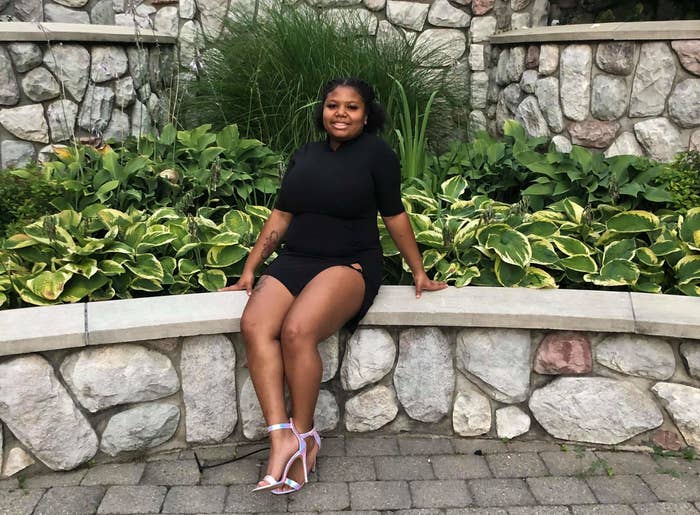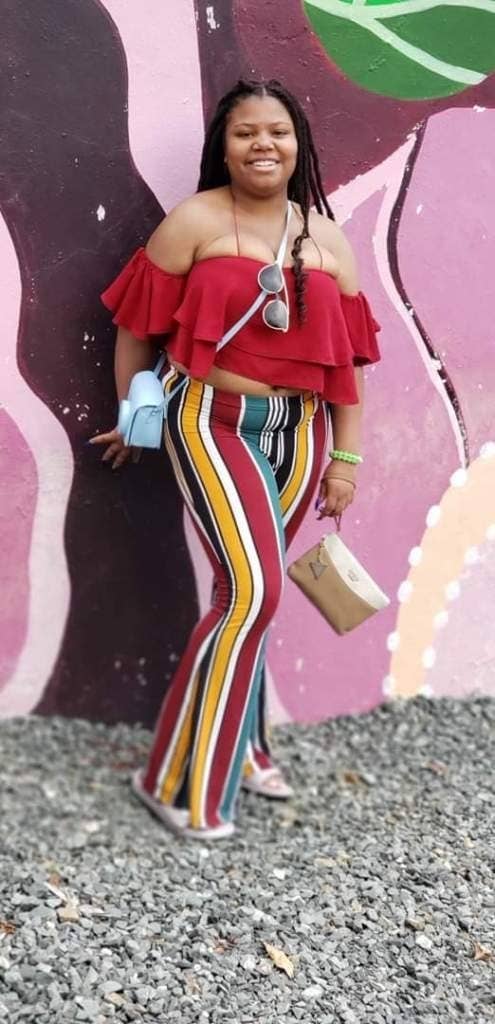
Kiara Cain, a lifelong Lansing, Michigan, resident, has felt a lot of pressure about voting in her first-ever presidential election this year, knowing that her state can decide the future of the nation at a chaotic moment in history.
Cain was never considering voting for President Donald Trump. But she didn’t want to vote for former vice president Joe Biden either without really understanding what he was offering.
Both in the presidential election and the down-ballot races, she has found it difficult to get to the bottom of a candidate’s actual policy positions. “You only get to see what they put out instead of the truth of things,” she said. She has also struggled to parse the complicated language of the legislative proposals and measures on the ballot.
Cain ultimately voted for Biden via an absentee ballot on Monday. She just did not expect that being an informed voter would be this challenging. She’s frustrated that it takes so much research to decide whom and what she’s voting for, and she worries that it will turn off young voters like herself from exercising their right to vote.
“When you’re thrown into something brand new and you have to know information for you to be able to make the correct choice, … it’s hard because it’s not something you’re used to,” Cain, 21, told BuzzFeed News. “You’re going into it blindly.”
Voter turnout among Black Michiganders like Cain will likely be crucial to winning the battleground Midwestern state in 2020 that helped propel Trump into the White House four years ago. But in a year wrecked by the coronavirus pandemic and massive social upheaval, counting on young first-time voters as they navigate the complex political process is asking for a lot. And Cain feels the weight of that responsibility to vote for the candidate who will most benefit her community and the country at this moment.
Democrats have carried Michigan since the early ’90s, until Trump broke through the blue wall to sweep all 16 of its electoral votes by an astonishingly slim margin in 2016. More than 4.8 million voters in Michigan cast their ballot that year, and Trump eked out a victory with 10,704 more votes than Hillary Clinton.
Trump’s narrow win in 2016 hinged on a perfect storm of voter turnout: Exit polls showed that college-educated and working-class white voters came out for Trump that year in higher numbers than expected. Meanwhile, Black voter turnout in Michigan shrank by 12.4% from the 2012 election. That combination pushed him over edge there and in other key states like Wisconsin and Pennsylvania.
After Trump’s four tumultuous years in office, which have included a badly mismanaged response to a pandemic, an ensuing economic crisis, and a hostile relationship with the governor of Michigan, Gretchen Whitmer, polls suggest that the shaky grip he held on the state in 2016 is slipping.
Michigan itself is going through a particularly turbulent year: More than 170,000 residents have had COVID-19, and more than 7,000 have died. Nearly 1 million people lost their jobs in the early months of the virus raging through the state, and experts say that it may take years to make up for those unemployment numbers.
Whitmer, who made the short list for Biden’s running mate, faced fierce backlash from Republicans for her response to the pandemic. Trump has singled her out, criticizing her for “locking down her state” to halt the spread of the virus and accusing her of “want[ing] to be a dictator.”
In October, after the FBI revealed it had thwarted a domestic terror plot by a right-wing militant group to kidnap Whitmer at gunpoint, try her for “treason,” and potentially kill her, Trump sulked that she did not thank him for the agency’s efforts. At a rally in Muskegon, Michigan, days later, he encouraged “lock her up” chants against the governor.
Both Trump and Biden have made plays for voters in Michigan. Biden has visited the state several times in the weeks leading up to the election. At a rally in Southfield in mid-October, he criticized Trump for his COVID-19 response and for stoking racism. He also defended Whitmer against the president’s attacks, saying, “There's not a better governor in the United States of America." On Friday, singer Lizzo, a Michigan native, campaigned on behalf of Biden and encouraged young people to vote early.
Trump has also held a number of rallies in the state to overwhelmingly white crowds, and he has taken to playing on racist fears about “low-income housing,” hoping to win over white suburban women, among whom his support has slipped. But he has been out-fundraised by Biden in recent months, and since September he has slowly gone silent on the airwaves in Midwestern states, including Michigan, that carried him to victory in 2016.
The Biden campaign said they’re engaged in regular voter outreach and campaign surrogate events aimed at Black Michiganders, ads on Black radio stations in the state, and a national “eight-figure multimedia investment" in ads targeting Black media outlets.
The Trump campaign did not respond to a request for comment.

A student at Lansing Community College, Cain has had her life thrown off-balance by the coronavirus pandemic. She has found it extremely difficult to adjust to online learning. As a senior taking five online classes this semester and holding down an internship that requires 10 hours of work a week, she cannot stomach looking at her phone or computer anymore. After being on the dean’s list for two years, she said, she now has failing grades.
“When classes first started, it was too much, and I broke down and cried in front of my mom, like, I can’t do this,” she said. “Everybody thinks it’s peach perfect working from home — but no, it’s only great when you have that choice to work from home, when that’s what you want to do. It’s harder when that’s something that’s pushed on you and you have to deal with it.”
Not being able to attend classes in person has not only had an impact on her grades, but it’s also felt strange, Cain said, to miss seeing voter registration drives on campus that pop up every election year.
College campuses play an important role in how young people become politically engaged. They’re often where young people have their first encounters with the political process. Most students in college are newly eligible to vote, and campus voter drives help register many students who would otherwise have to travel off campus to do so. Cain herself registered to vote on campus at some point before the pandemic (she doesn’t remember when exactly). And though Lansing Community College is not a polling location, many college campuses across the country turn into polling places on Election Day, serving as a convenient location for students to cast their ballot.
Cain has been excited to vote for president for the first time, despite feeling the pressure of making an informed choice. She said she really does believe that Black voters in Michigan can make a huge difference in the election — especially if young voters make themselves heard.
She feels empowered at the polls this year in a way she did not when she voted in the state elections last year. At the time, she voted out of a sense of civic duty, but she said she did not really know what she was voting for.
“I didn’t really feel empowered at all. I was just like, OK, I’m doing my part. I felt like I was doing what everybody told you you’re supposed to do,” she recalled. “I wasn’t really doing something that meant something to me.”
Cain's interest in politics is relatively new, as is the case for many others her age. Up until a few months ago, she did not know much about the voting process, or that down-ballot races were crucial, or that in 2016, Clinton won the popular vote but lost the electoral vote. She did not pay much attention to the primaries in early 2020.
It was only recently, when she started her internship at One Love Global — a Black-led community organizing group in Michigan that fosters political engagement and helps young people build leadership skills — that she began to realize her vote carried weight. The nonprofit group does not endorse any political candidates. Cain said she wished she had had the opportunity to work with her community on that scale when she was younger.
“If I would’ve had that, I would’ve been more confident and outspoken when I was younger,” she said.
Even though she voted for Biden, she was not particularly enthusiastic that her first presidential election left her to choose between these two older white men.
She is plainly disdainful of Trump’s record on race. The slew of racist dog whistles he has made from the Oval Office, while boosting white supremacists and praising himself as the “least racist” person in the room, have alienated plenty of people of color, including Cain.
“I am not a fan of Donald Trump and the things he’s said,” Cain said. “But I also think it’s not fully his fault. … That’s what he was raised to believe in. When he was raised to believe in that, that became his standard and his normal.”
She is also put off by his outbursts on his Twitter account — which she said “should have been deactivated a long time ago” — and believes it set a bad example for Americans.
“He has a temper tantrum when he doesn’t get his way with things,” she said about the president, who is 74. “Like, are you trying to show me that it’s OK to act like that? If I go to the internet and call things fake and basically throw a fit, I’m going to get my way? … The world doesn’t work that way.”
Cain’s ideal president is someone who is committed to being a leader for everyone and bringing out the best in people. Biden may not be her ideal candidate, but she believes he will try to unite the country after four years of deep racial and cultural division that Trump encouraged.
“I’m voting for Joe Biden just because I’ve seen more of his heart and his personality as a human instead of somebody that’s trying to say the right word at the right instances,” she said. “He slips up, he makes mistakes, and it’s not that he goes to social media or acts out in a certain way when things go wrong for him. He holds himself in a different manner. It’s still professional, and it’s like…an adult.”
She praised him for picking Kamala Harris as his running mate; she believes it’s important to have a Black woman as vice president, but thinks young Black voters would have been more impressed if Whitmer were on his ticket because of how she has dealt with the attacks from Trump.
“I know a lot of younger people that love her just because of how she handled herself,” Cain said. “Everybody was like, you know what — and they started calling her Big Gretch — and they were like, ‘She’s invited to the next cookout.’”
